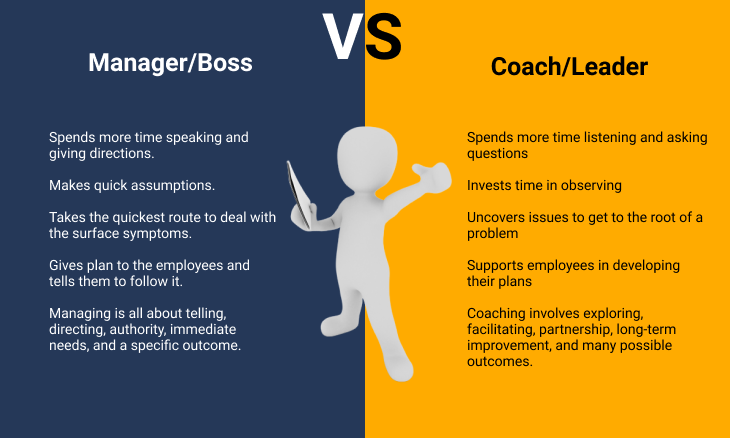Coach or Manager? What does your team want?
5 minutes read

One of the most important lessons you need to learn in a leadership role is to know “the difference between being a manager and being a coach”.
This leads to learning another important lesson: “The difference between Management and Leadership”
If you could understand these basic differences it will help you to become an efficient leader. Let us begin to understand this difference by taking the example of baseball and basketball.
Coach Vs Manager: Basketball Vs Baseball
Have you ever wondered why the head of the baseball is called a manager while the head of the basketball team is called a coach? Apart from the obvious differences between the two sports, it also has to do with how the players are coached and managed during the games. While baseball is all about directing players, basketball requires more of teaching the players.
During a baseball game, the manager focuses primarily on strategy and managing the flow of the game. He decides who pitches and when. Positions the players in the field. And, relays commands to coaches, who then tell players about what actions to take on the field.
In a basketball game, a coach has the same authority as the baseball manager, he gets more involved with the players and their actions on the court. His role is inclined more towards developing the players rather than directing them. He calls out plays and defensive schemes to the players, but they are then free to implement those (using their skills and knowledge of the game) as they see fit. Apart from coaching he also offers encouragement, support, and suggestions to the players.
The role and responsibilities of a baseball manager and basketball coach may overlap but the impact that they make on their people is different. Let’s look at the contrast of the role and responsibilities of a coach and a manager in more detail in the image below:

What does all this have to do with a business leader? Here is what this means for you. As a business leader, you sometimes have to be a coach and sometimes a manager. This is especially true if you are in the sales department because sales role requires both coaching and managing in equally significant amounts from the sales leaders. You need to know when to wear which hat and it all depends on the scenario and your team. Often you will need to adopt a combination of these two styles depending on
The complexity of the task assigned
The experience of your people with the task
And, the competency levels required to complete it with excellence
Here are 3 different scenarios where you need to coach, manage and use a combination of both to train a sales employee:
Direct the Employee (Managing)
When the employee has low to moderate competence with the skills and abilities needed to complete the task. Be sure to define excellence (what, how and when), and provide specifics (templates, examples, etc.) so that the person can achieve the desired outcome. Direct when a person:
Is new in the role
Is new to the company
Is new to the client/customer
Has new job responsibilities or tasks
Has new ways of working
Delegate to Employee (Coaching and Managing)
When the employee has moderate to high competence. Again, define excellence so both sides have clarity around the goal. Then let the employee determine the approach they will take and keep you informed about their progress as and when they do. Ask questions and provide direction and specific support when necessary. Delegate when a person has:
Some experience in the role
A track record or competence
A sensitive task or client
Confidence in their abilities
Similar ways of working
Develop the Employee (Coaching)
When the employee has high competence and high commitment to the task. Then define excellence and get out of the way! Give plenty of recognition for the successful completion of the task. Then determine the person’s next challenge. Develop when the person:
Has extensive experience
Has demonstrated evidence
Has experience in similar clients or task sensitives
Is growing competences
Is trying new approaches
Coaching and managing are really two sides of the same coin in sales. So, take the tips from this blog and be a coaching sales manager or a managing sales coach according to the situation and your employees.
Want to know how to coach your sales reps into sales champions?
Read: How to coach your salespeople into sales champions
Looking for more on Sales Coaching PlayBooks?
Sales Coaching PlayBook Part 1 - Competency Framework
Sales Coaching PlayBook Part 2 - Training the managers to Coach
Sales Coaching PlayBook Part 3 - How to Measure the Success of Coaching
Are you Planning to Implement Video Coaching in your Sales Process?
Best Practices to drive Video Coaching
5 Reasons to use Video Coaching in your Sales Process
SmartWinnr’s on-the-job coaching automates your sales coaching process. Plugin your own competency frameworks to measure and coach your sales teams. Managers play a crucial role in the coaching process. They do baseline assessments, set coaching goals for joint field visits, and provide crucial feedback to their sales reps.
Curious to learn more about it? Book a demo today!
Published on Mon Oct 21 2019
